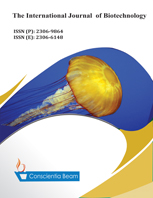Degradation of the Organophosphorus Insecticide Diazinon by Soil Bacterial Isolate
Abstract
Microorganisms isolated from soil sample using enrichment culture technique have been grown in the minimal growth media where diazinon served as a sole carbon source. Total three bacterial strains were screened and identified by morphological and biochemical studies as Pseudomonas peli, Burkholderia caryophylli and Brevundimonas diminuta and designated as Pseudomonas peli BG1, Burkholderia caryophylli BG4 and Brevundimonas diminuta PD6, respectively. All these isolates were able to completely degrade 20 mg/l diazinon in mineral salt medium (MSM) as a sole carbon source within 12 days of incubation. The bacterial growth and diazinon degradation were accelerated by these isolates when MSM supplemented with 0.5 % (w/v) glucose as an additional carbon source. The maximum degradation rate by the isolates BG1, BG4 and PD6 were 3.350, 4.265 and 3.140 mg/l/d, respectively. The bacterial growth and diazinon degradation rates were increased by these three isolates when MSM supplemented with 0.5 % (w/v) glucose as an additional carbon source. The maximum degradation rates were 4.556, 5.367 and 5.885 mg/l/d for the isolates BG1, BG4 and PD6, respectively in the presence of glucose. pH of the growth medium decreased more sharply in presence of glucose as a consequence of microbial metabolism of glucose. The results of this study suggested a correlation among diazinon degradation, microbial growth and pH in MSM with or without glucose during diazinon degradation studies.

